published in: The Journal of the Orders and Medals Society of America, volume 58, # 5, 2007, pages 19-29
Before the unification of East and West Germany during the 1980's, medal dealers tried very hard to market the Saxon Order of Albert. There was even an article written and titled “Poor Albert” to promote the unpopular order. Bottom line was that nobody really collected this “East German” order during the ending phase of Communism.
Who cared for Saxon orders and medals during this time anyway? This Order of Albert was certainly the most common, the least desired and the least expensive decoration among medal collectors.
The ideal situation for somebody like me still being in school and making about $ 2.50 an hour as a delivery boy at my mother’s pharmacy. The Order of Albert wasn’t ugly and undesirable as everybody thought. It certainly was affordable, and all grades had beautiful real golden crosses in amazing craftsmanship.
Armed with all my savings, I went to the medals and collectors fair in Dortmund, Germany, to buy a few of those common and reasonably priced pieces. I was going for at least a nice grand cross¹ and for some golden knight crosses² as well. After digging through piles of military memorabilia, I was very surprised that my plan didn’t work out. Was the author of that article wrong? Was the Order of Albert actually one that collectors did buy? I actually ended up with a late World War I Commanders Cross in silver gilt without the neck ribbon or case for – well – only US $ 300.-.
I found over time that the truth was, even though the order was reasonably priced, a handful of collectors in Germany were actually very interested in it.
Lower grades, especially with swords, were very common. On the contrary, the higher grades and those with crown were almost unobtainable. It took me about three years finally to trade one of those unobtainable pieces, a golden grand cross star with swords (Issue period), with only 36 total awarded decorations, for a much more popular Grand Cross Star of the Baden Zaehringer Lion with swords (only 34 total awarded decorations).
After this thrilling experience, I started putting some effort into the plan to obtain decorations with Swords on the Ring. This was an interesting topic, since the Saxons issued those much earlier and in a totally different manner than all the other German states.
King Johann of Saxony issued swords to the Order of Albert on October 29, 1866, in conjunction to the Prussian - Austrian war. The Saxons fought on Austria's side in the battle of Königgrätz. Those brave men participating during this war had a chance to receive on of those newly issued order decorations and would wear the swords visible for everyone to see. To quote the orders statues:
"We Johann by the grace of god king of Saxony have decided to award the Albert Order, founded on December 31, 1850, in its initial 5 grades for merit during war and as military award.
1. In those cases all awards mentioned in § 4 of the statues of the Order of Albert, order decorations as well as those stars belonging to grand crosses and commander crosses first class will show two crossed swords affixed behind the center medallion."
The Franco Prussian War in 1870/71 made it necessary to amend the orders statues again due to the high demand of decorations for bravery. already 4 years after issuing the swords to the order the swords on ring were put to life. The statues read as follows:
"1. If the Albert Order is awarded to persons for merit in war and as military award that are already in possession of the same grade of the order, the swords have to be attached for the honor cross and the knight cross under the ring, the commander cross under the crown and on all stars above the center medallion.
2. When awarded a higher grade of the order for merit in peace to the bearer of the lower grade of the Albert Order with war decoration the swords remain but will be worn on the higher grade as described in 1.
Dresden, December 09, 1870."
Therefore, swords were awarded for bravery and war merit. But what happened if such a person would be promoted during peacetime to a higher but civil grade of the same order? Since most German states prohibited the wear of the lower grades of an order after being promoted to a higher grade, the full meaning of the lower grade became obsolete. A brave man, easily identifiable by the swords on his decoration would look rather normal after being promoted away from his bravery decoration. Yet Swords on the Ring were a sign for an award for bravery in a lower grade of an order in general. All German states had regulated their order statutes after the procedure mentioned above, except the Kingdom of Saxony: only those that had already been awarded with a decoration for civil merit would wear their swords on the ring when awarded the same grade for bravery or war merit - "the far side".
Therefore, some brave soldiers would never wear their order with the full meaning of swords for bravery.
The Saxons, coming to their senses in 1906 changed the statues and adapted the common practice for awarding swords on the ring.
After an edict of December 8, 1906, it was even possible for those eligible to exchange their decorations for those with swords on ring. Yet, the price difference had to be paid.
Even though the list was quite long, only the two following made immediate use of this new regulation, few followed at a later date:
| Grand Cross | Hausen, Max Freiherr von | Generalleutnant |
| Commander 2nd Class | Baumgarten, Gustav | Oberst z.D. |
The cost for the transformation at Scharffenberg was Grand Cross to Grand Cross with swords on Ring 43,25 M and Commander 2nd Class to Commander 2nd Class with Swords on Ring 24,-- M. The amount of money that had to be paid may explain why many did not exchange their decorations.
Calculating the odds by comparing Albert Order with swords on ring with the Prussian Red Eagle order led me to believe that it should be possible to come across one of those with little effort. Keep in mind that the author of “Poor Albert” mentioned that a) nobody collected this order and b) the order is quite common.
But asking fellow collectors for reference pieces and even approaching various museums in West Germany uncovered the brutal truth. There was not one single piece known. The only piece I came across was a commander badge 2nd model in gold with swords on the ring, sold at an auction in Germany.
Indeed, it took me and all my collector friends until the Unification of Germany to learn about the actual number of awarded pieces (of course the Order of Albert became quite popular):
THE GOLDEN STAR WITH SWORDS ON THE RING TO THE GRAND CROSS WITH SWORDS ON THE RING
| 09/21/1909 | Kirchbach, Hans von | G d.A. (not returned) |
THE GRAND CROSS OF THE ALBERT ORDER WITH GOLDEN STAR AND SWORDS ON THE RING
| 05/14/1917 | Wilsdorf, Viktor von | GL (not returned) |
SWORDS ON THE RING TO THE GRAND CROSS OF THE ALBERT ORDER
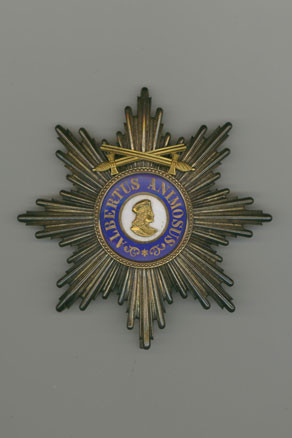 | 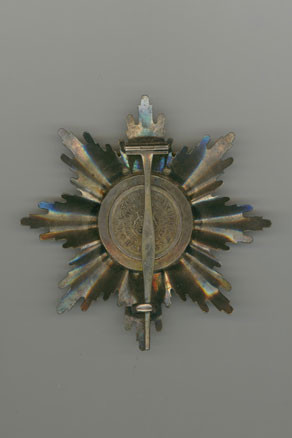 |
The Grand Cross Star with swords on the ring by Scharffenberg
| 01/03/1871 | Fransecky, Eduard von | KP GL (returned on 06/23/1890) |
| 01/29/1871 | Rheinbaden, Albert von | KP GL (returned on 11/26/1880) |
THE GRAND CROSS OF THE ALBERT ORDER WITH SWORDS ON THE RING
| 10/04/1879 | Montbe, Alban von | GL (returned on 04/13/1911) |
| 06/19/1883 | Gottberg, Walter von | KP GL (not researched yet) |
| 04/17/1901 | Hausen, Max Freiherr von | GL (bought 10/14/1922) |
| 03/26/1907 | Basse, Julius von | GL z.D.( returned on 10/21/1938) |
| 08/29/1907 | Bissing, Moritz Frh. von | KP G d.K.( not researched yet) |
| 05/18/1908 | Kirchbach, Hans von | G d.A.( returned on 09/27/1909) |
| 10/26/1908 | Müller-Berneck, Karl von | GL z.D.(not returned) |
| 05/18/1909 | d'Elsa, Karl | G d.I. (not returned) |
| 09/21/1910 | Welck, Dr.Georg Frh. von | WGR (returned on 03/15/1912) |
THE COMMANDER CROSS 1ST CLASS WITH SWORDS ON THE RING
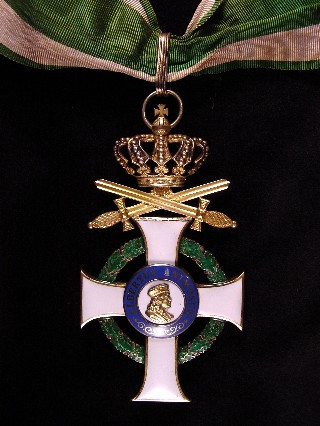 | 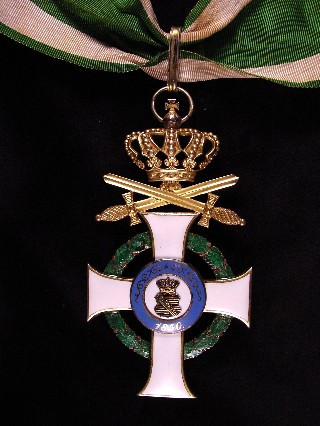 |
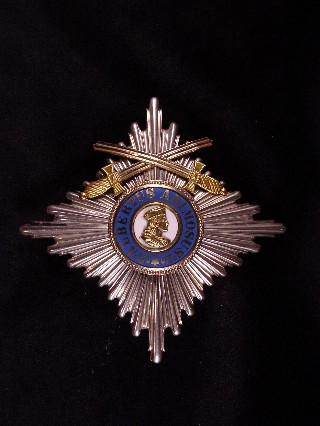 | 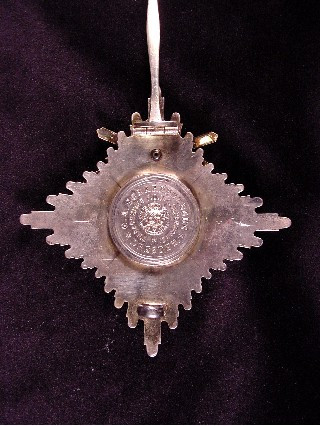 |
Commander set 1st class in silver gilt by Scharffenberg
THE SWORDS ON RING TO THE COMMANDER CROSS 2ND CLASS
| 11/25/1870 | Oppermann | KP Ing-OL (returned on 12/08/1892) |
| 11/11/1872 | Schrötter, Baron von | KP OL (returned on 12/27/1884) |
| 12/22/1905 | Deimling, Berthold von | KP O (unknown) |
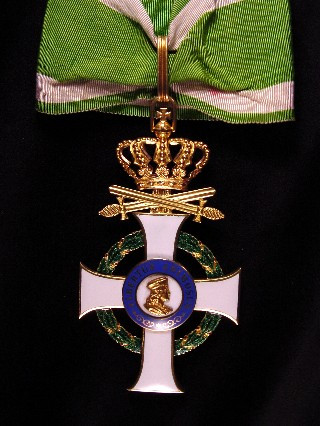 | 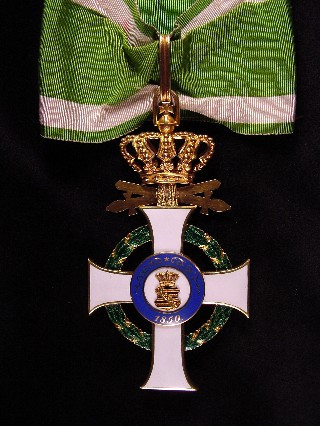 |
The golden Commander or Grand Cross with swords on the ring by Scharffenberg
THE COMMANDER CROSS 2ND CLASS WITH SWORDS ON THE RING
| 09/20/1886 | Baumgarten, Gustav | O z.D. (returned on 12/24/1917) |
| 06/02/1908 | Bucher, Friedrich Hugo | O z.D. (returned on 02/13/1911) |
| 08/19/1908 | Falkenhayn, Erich von | KP O (unknown) |
| 12/21/1910 | Glasenapp, von | KD O (unknown) |
| 05/15/1914 | Meister, Johann | O (returned on 07/26/1916) |
| 04/26/1915 | Scheibe, Albert | O z.D. (not returned) |
| 04/18/1917 | Posern, Georg von | Khr.,char M a.D. ( not returned) |
| 05/10/1918 | Straube, Erich | GM z.D. (bought 08/06/1926) |
| 05/10/1918 | Baumann, Konstantin von | O z.D. (returned on 07/02/1934) |
| 05/10/1918 | Wohlrab, Hans Friedrich Karl | Geh.FinRat (not returned) |
| 07/24/1918 | Kiesenwetter, Hermann von | GM z.D. (returned on 08/10/1926) |
THE OFFICER-CROSS WITH SWORDS ON THE RING:
| 05/16/1907 | Boxberg, Curt von | Khr. , M z.D. (returned 02/05/1914) |
| 05/18/1909 | Boddien, Georg von | RM d.R.a.D. (returned 08/17/1927) |
| 08/30/1909 | Schönberg, Hugo Adolf von | O z.D. (returned 02/09/1917) |
| 09/18/1909 | Siegel, Dr. Hugo Ernst | Geh.MedRat (returned 08/01/1925) |
| 02/28/1910 | Posern, Georg von | Khr. (returned 05/22/1917) |
| 09/13/1912 | Meister, Johann | O (returned 05/26/1914) |
| 05/15/1914 | Kormann, Dr. Georg | Justizrat (returned 01/17/1918) |
| 05/15/1916 | Lentz, Felix | OL z.D. (returned 08/03/1933) |
| 10/17/1917 | Rühlemann, Dr. Gustav | GA 2.Kl.a.d. (bought 02/14/1923) |
| 01/03/1918 | Keyserling, Karl Graf von | DP H d.L.a.d. (unknown) |
| 05/10/1918 | Gregory, Friedrich Frh.v. | O a.D. (returned 09/20/1933) |
| 05/10/1918 | Degen, Dr. Ernst Walter | Geh. Justizrat (unknown) |
THE KNIGHT’S CROSS 1ST CLASS WITH CROWN AND SWORDS ON THE RING
| 05/10/1918 | Enders, Emil Max Bruno | Kommerzienrat (not returned) |
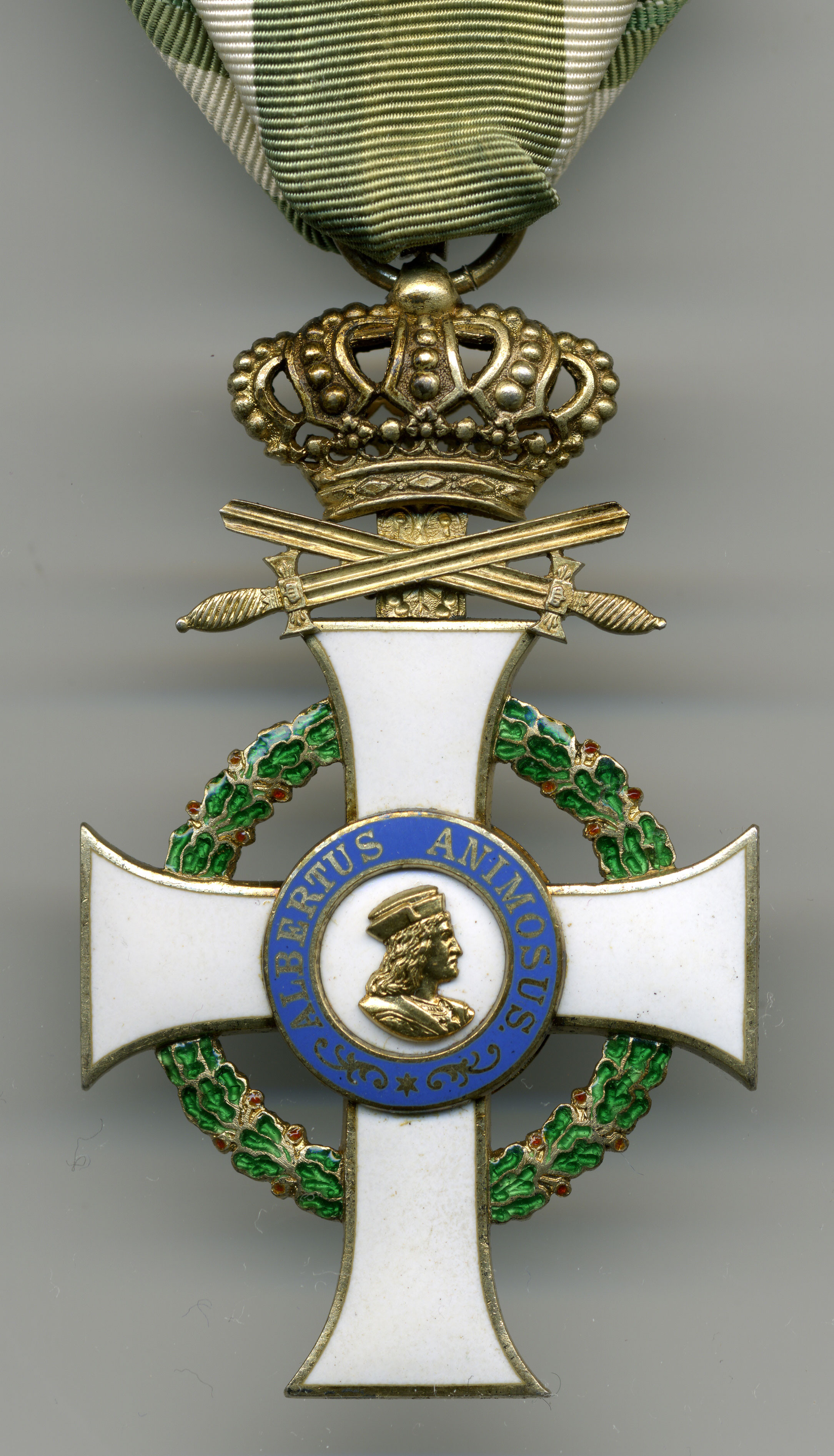 | 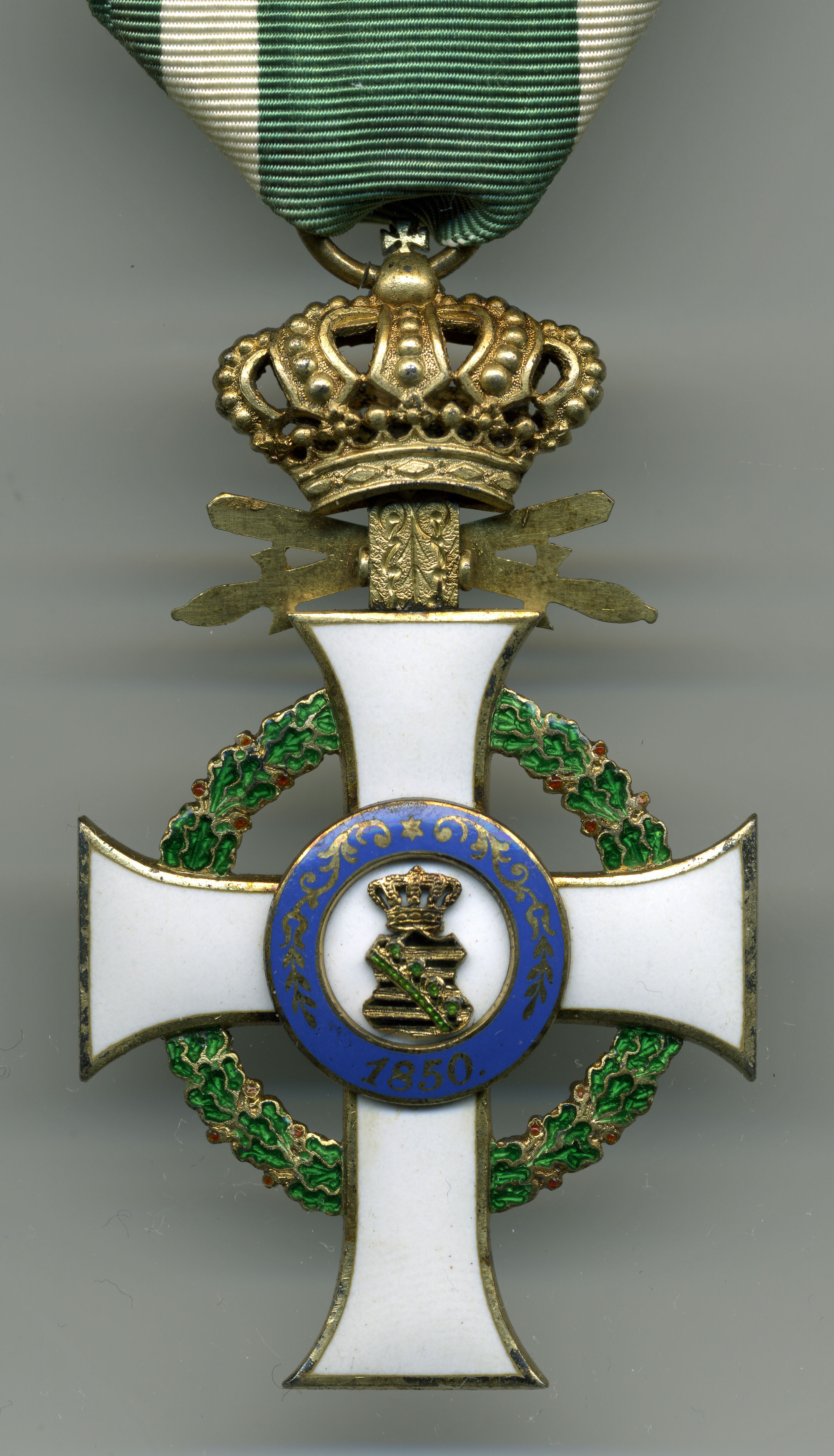 |
Cross in gilt silver. An identical cross resides in the Collection of the “Militärhistorisches Museum der Bundeswehr” in Dresden.
THE KNIGHT’S CROSS 1ST CLASS WITH SWORDS ON THE RING
| 04/20/1914 | Fritsch, Alexander Frh.v. | RM z.D (not returned) |
| 05/15/1914 | Benzien, Willibald | M (returned 02/24/1915) |
| 05/15/1914 | Einsiedel, Haubold von | M (returned 06/26/1917) |
| 05/15/1914 | Leonhardi, Gottfried | M (bought 09/11/1922) |
| 05/15/1914 | Krantz, Rudolf | M (returned 01/09/1917) |
| 04/19/1918 | Chilian, Erich | H d.R. (not returned) |
| 05/10/1918 | Löwe, Hermann | H d.R.a.D. (not returned) |
| 05/10/1918 | Leonhardt, Dr.K.J.Fr. | LandGerRat (not returned) |
| 05/10/1918 | Breiting, Franz Arthur | AmtsGerRat (not returned) |
| 05/10/1918 | Meusel, Theodor Friedrich | AmtsGerRat (bought 12/19/1934) |
| 05/10/1918 | Hahn, August Johann | Baurat (not returned) |
It then became clear that nothing ever surfaced before 1989. The first real pieces I ever saw were those on display at the Armeemuseum in Dresden. Those pieces were seized from the former Oswald collection during GDR times, including a silver gilt Officer Cross with Swords on the Ring, a Knight Cross 1st class with crown and Swords on the Ring, and a 1st model Grand Cross with the modified medallion of the 2nd model with Swords on the Ring.
I later got introduced to the collector who was able to acquire the earlier-mentioned commander badge 2nd model in gold with swords on the ring. The only other decorations I could find in other collections were a commander set 1st class of the 2nd model in Silver gilt and a knight 1st class with swords on the ring 1st model body type with modified 2nd model medallion.
It was very much evident that the swords on ring varied in their design and making. Some didn't even look like they were made by the known Saxon court jewelers. Where some actually fake? Those being promoted from a bravery decoration into a higher civil grade had to modify the new decoration on their own to be reimbursed later by the state. This decree from July 05, 1906, makes it quite tricky to clearly identify original pieces. We can only assume that there was a list of recommended court jewelers. Luckily, most pieces were modified by those court jewelers that made the decorations for the Saxon orders chancellery.
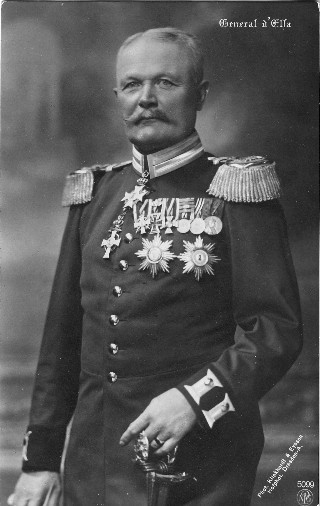
General D'Elsa wearing Grand Cross set with Swords on Ring
Yet, the only three original knight crosses with swords on the ring were not modified with Scharffenberg, Roesner, or Glaser swords.
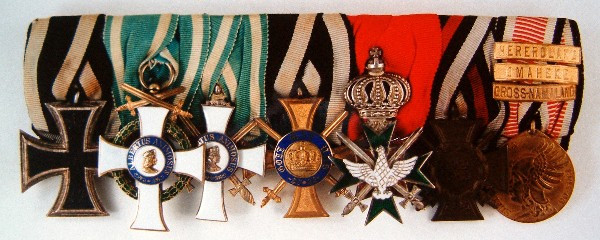
The medal bar above was worn by von Fritsch and is the only knight cross with swords on the ring that can be linked directly to the bearer.
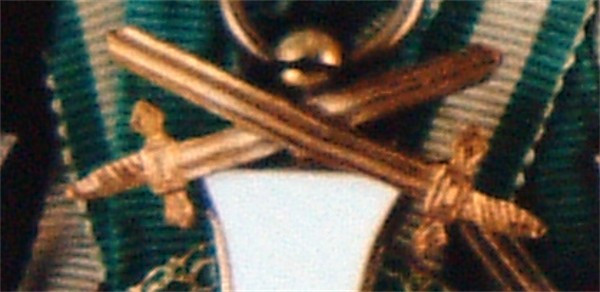
Detail of the v. Fritsch swords. The swords of the Crown Order 4th class are identical and seem to have been made during the time the Hindenburg cross was awarded to von Fritsch in 1934.
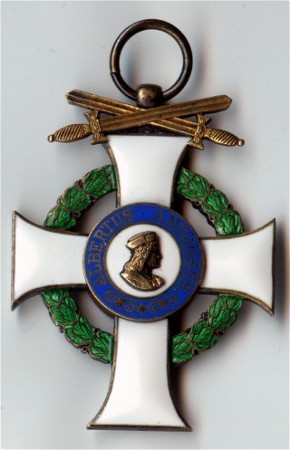 | 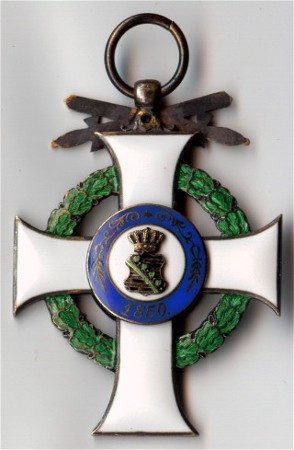 |
Original silver gilt Scharffenberg made knight cross 1st class with swords on ring
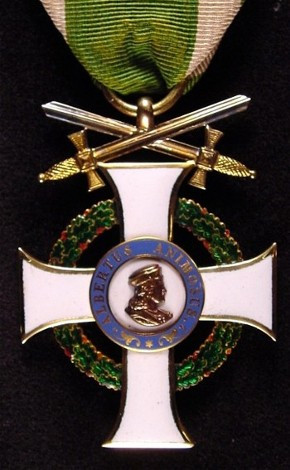 | 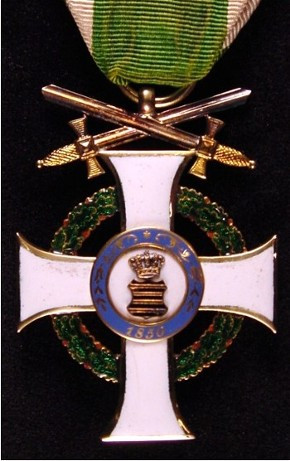 |
Golden knight cross with swords on the ring. This 1st type cross was not only modified to attach swords on ring, but had also been converted into the 2nd type by replacing the bust on the avers medallion. Swords by Godet in Berlin.
My latest discovery was the “Sonderstufe” (special grade), or Golden Grand Cross star with Swords on the Ring to the Grand Cross. This very nice set belonged to the War Minister of Saxony Viktor von Wilsdorf. The Scharffenberg made set is a perfect example of a late war production. Less expensive materials, but still outstanding workmanship is characterizing this set, which was awarded in 1917.
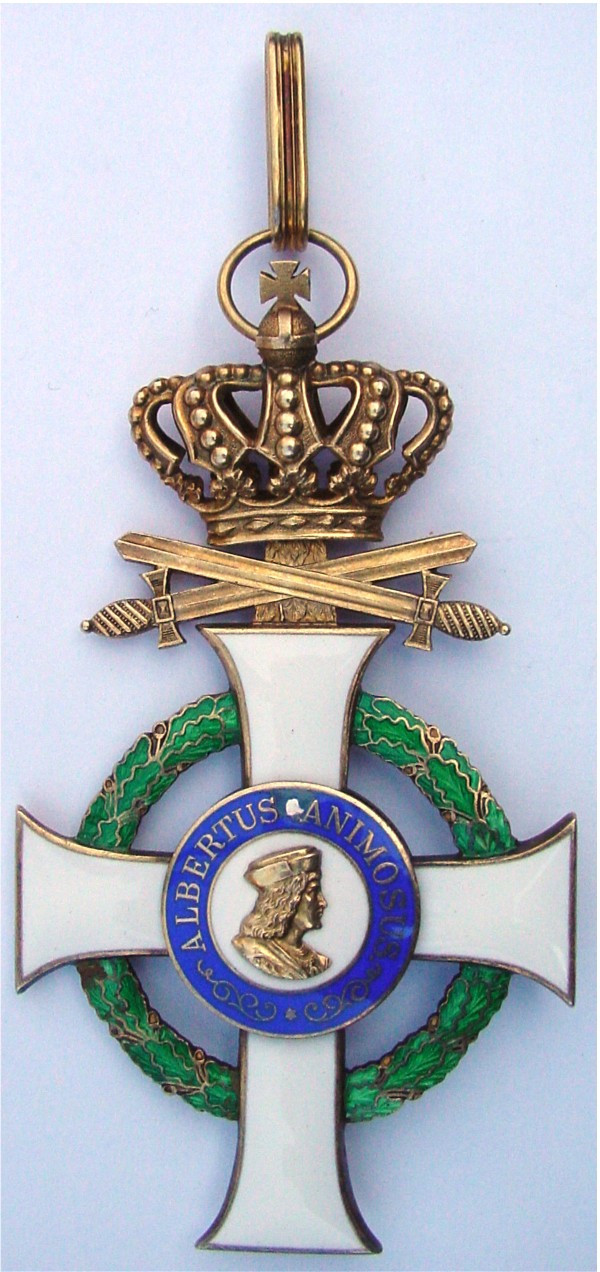 | 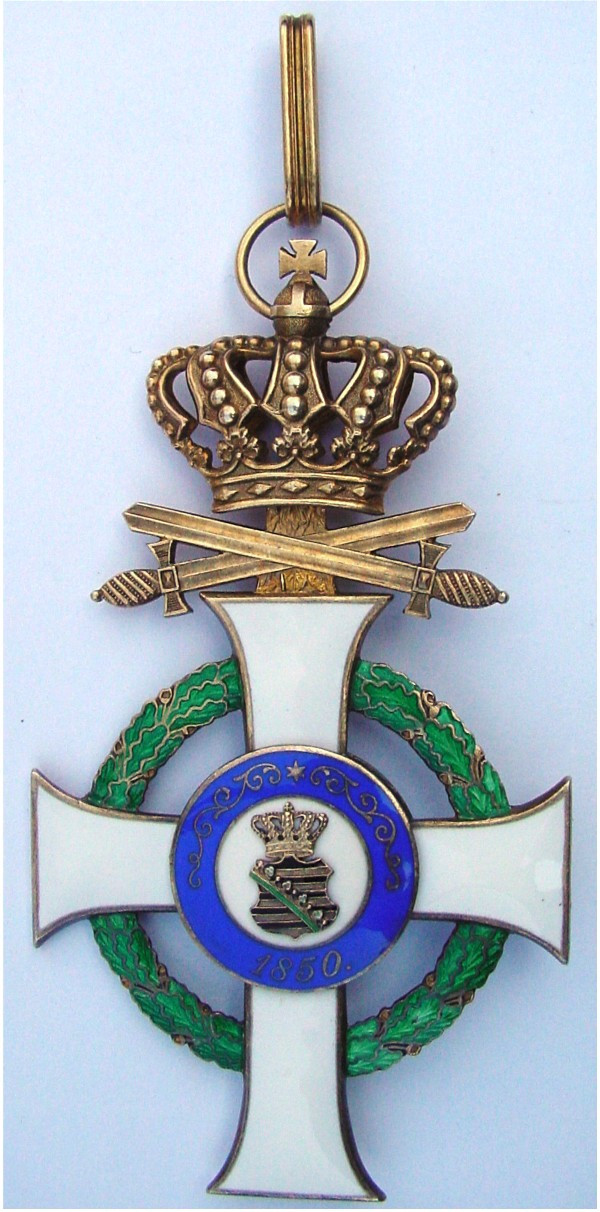 |
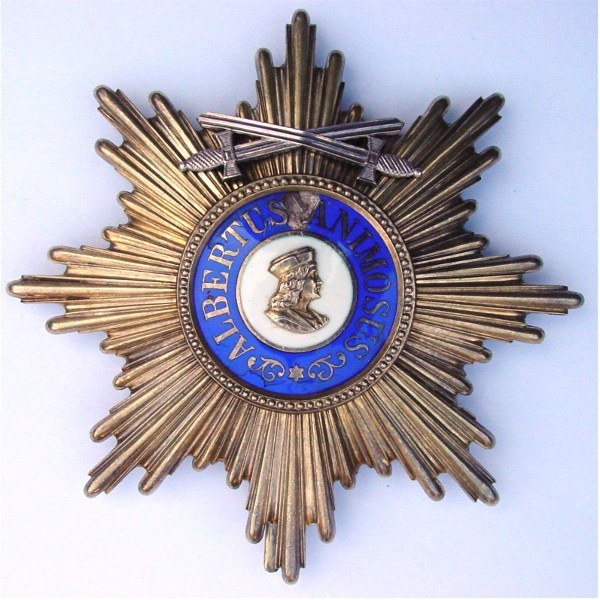 | 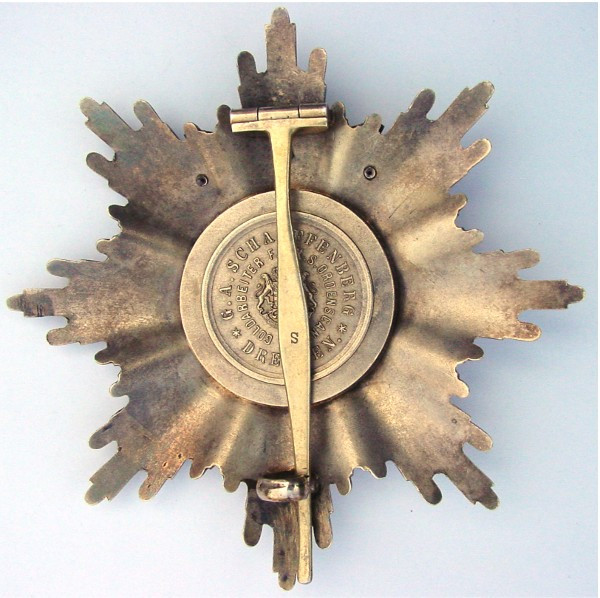 |
Award documents are extremely rare. So far, only three certificates were found. One is the award document of the last War Minister Hans von Kirchbach for the award of the Grand Cross with swords on the ring in 1908, followed by another one announcing the award of the golden star to the Grand Cross with Swords on the Ring in 1909.
The oil painting on the right shows him with all his high ranking decorations.
The medal bar contains the knights cross 1st model with swords for 1870/71, which is the trigger for his later awarded golden star with swords on ring to his grand cross with swords on ring.
You may click on the picture to open a window showing a more detailed picture of the two decorations. his star is one of the higher quality earlier ones with the double Perl ring in the medallion center.
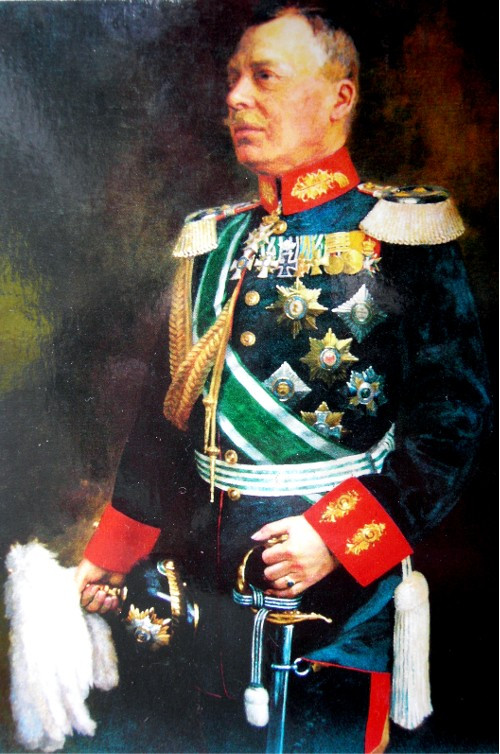
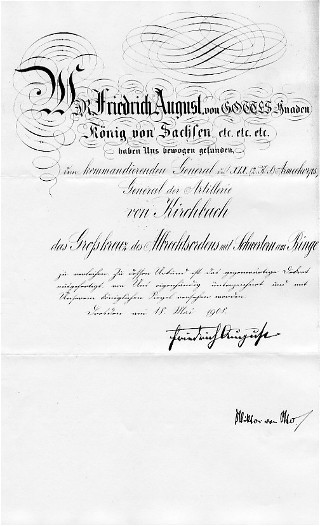 | 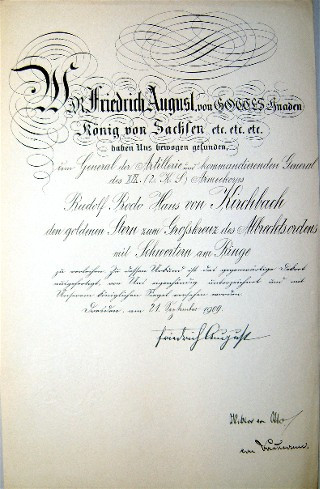 |
The third document we know about is the certificate for the knight cross 1st class with swords on ring to Arthur Breiting.
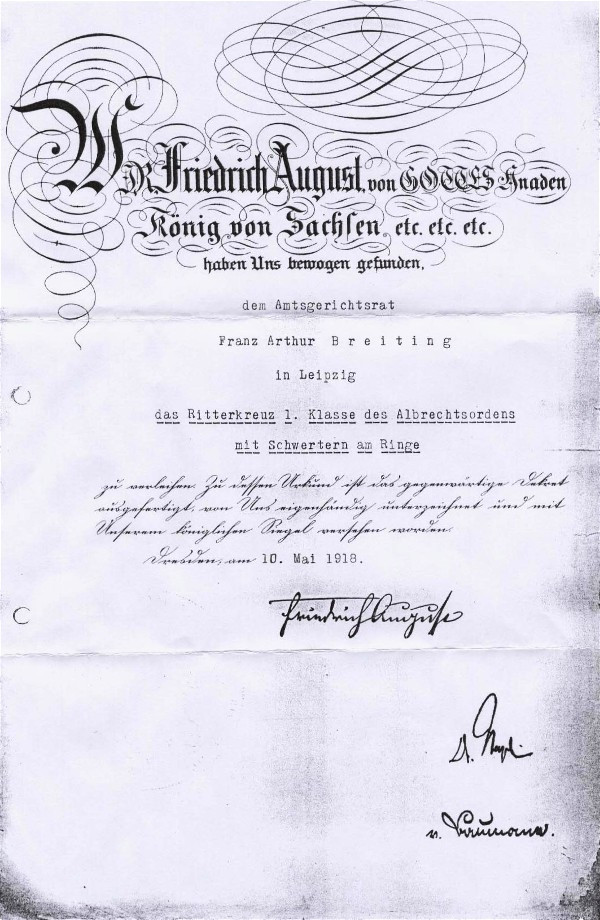
One last word: There never have been any decorations with swords and swords on ring.
I would like to thank Erhard Roth for his never-ending research effort in the Saxon archives, as well as Dietmar Raksch, who always has been my very good friend and mentor. I am especially grateful to have known George Seymour, who always helpful to those researching the history of orders and medals. He was kind enough to let me photograph the biggest collection of Albert Orders with swords on ring.
¹ Catalogue value for a golden grand cross in 1987/88: DM 900.-/US $500.-.
² Catalogue value for a golden knight cross in 1987/88: DM 460.-/US $255.-.
© A. Schulze Ising, V/06